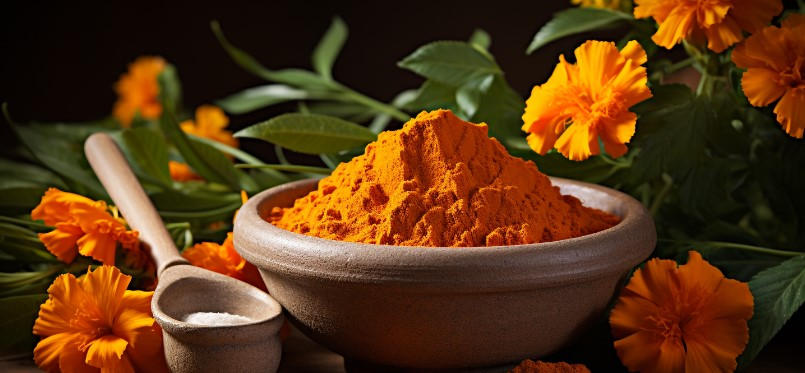Эти овощи богаты лютеином, который может защитить глаза и предотвратить близорукость

Our eyes are an important window to communicate with the world, and protecting their health is the responsibility of each of us.
Nearsightedness is a common eye problem that affects our vision and quality of life.
There are many reasons for myopia, including genetics, environment, lifestyle habits, etc. So, can we prevent or improve myopia through diet? The answer is yes.
There is a substance called лютеин, which can effectively protect the eyes against myopia.
So, what is лютеин? Which foods contain lutein? How should we consume lutein?
Лютеин
Lutein is a naturally occurring carotenoid that is found in the chloroplasts of plants and gives them a green or yellow color.
Lutein is a powerful antioxidant that mops up free radicals and prevents cell damage.
In the human body, lutein is mainly distributed in the macula of the eye, which is the central area of the retina responsible for our central vision and color vision.
Лютеин filters out harmful blue light and protects the retina from light damage.
Lutein can also enhance blood circulation to the retina, improve the function of the optic nerve, and improve vision. The lack of lutein can lead to macular degeneration, resulting in vision loss, blindness and other serious consequences.
Lutein is therefore essential for eye health.
vegetables rich in лютеин
Lutein is a fat-soluble substance that the body cannot synthesize on its own and can only be ingested through food.
In general, dark green or dark yellow vegetables contain more lutein.
Below, we introduce 6 lutein-rich vegetables that are common ingredients in our daily lives and can be easily added to our diets.
Spinach
Spinach is a very healthy vegetable, it is not only rich in lutein, but also contains other carotenoids, vitamins, minerals and other nutrients.
Spinach can help us to supplement iron, prevent anemia, enhance immunity, promote digestion, anti-aging and so on.
Spinach has the highest lutein content of any vegetable, with 11.3 mg of lutein per 100 grams of spinach.
Eat a bowl of spinach to meet our daily needs of lutein. Spinach can be used in soups, stir-fries, salads, etc. It is a very delicious food.
Капуста
Kale is also called kale, kale flower, broccoli, etc., it is a cruciferous vegetable, shaped like a flower.
Kale contains a lot of lutein, with 8.3 mg of lutein per 100 grams of kale.
Kale also contains other carotenoids, vitamin C, vitamin K, calcium, selenium and other nutrients, can enhance the health of bones, teeth, skin, prevent colds, cancer and so on.
Kale can be used in soups, stews, baking and more, and is a very diverse food.
Кукуруза
Corn is a very popular grain, it is not only rich in carbohydrates, dietary fiber, protein, etc., but also contains more lutein.
There are 1.4 mg of lutein per 100 grams of corn. The lutein of corn is mainly found in the yellow part of corn, so choosing yellow corn is more conducive to the uptake of lutein than white corn.
Corn can be used to make porridge, cooking, baking, popcorn, etc., is a very delicious food.
Mustard Blue
Kale is a cruciferous vegetable whose stems and leaves are edible and have a fresh, spicy taste.
Kale contains more lutein, with 1.2 mg of lutein per 100 grams of kale.
Kale also contains other carotenoids, vitamin C, vitamin A, calcium, iron and other nutrients, can improve the quality of blood, prevent infection, anti-inflammatory, lower blood pressure and so on.
Kale can be used to make stir-fries, soups, marinated flavor, etc., is a very cheap food.
Broccoli
Broccoli is a cruciferous vegetable that is shaped like a green tree with many small flowers.
Broccoli contains more lutein, with 0.9 mg of lutein per 100 grams of broccoli.
Broccoli also contains other carotenoids, vitamin C, vitamin K, calcium, sulfur and other nutrients, can enhance the liver’s detoxification ability, prevent cancer, protect blood vessels, anti-allergy and so on.
Broccoli can be used to make stir-fries, soups, salads, etc., and is a very refreshing food.
Asparagus
Asparagus is a very high-grade vegetable, its stems and flowers are edible and delicious.
Asparagus contains more lutein, 0.7 mg of lutein per 100 grams.
Asparagus also contains other carotenoids, vitamin B, vitamin E, potassium, magnesium and other nutrients, can promote metabolism, diuretic detoxification, anti-aging, protect the nervous system and so on.
Asparagus can be used for stir-frying, frying, roasting, steaming, etc. It is a very elegant food.
Conclusion:
Lutein is a very beneficial substance for eye health, it can protect the retina, filter blue light, prevent myopia.
We can supplement lutein by eating vegetables rich in lutein, such as spinach, kale, corn, broccoli, broccoli, asparagus, etc.
These vegetables not only contain lutein, but also contain other nutrients that can enhance our health.
We should eat more of these vegetables to provide enough nutrition for our eyes and keep good eyesight.
Backvita
